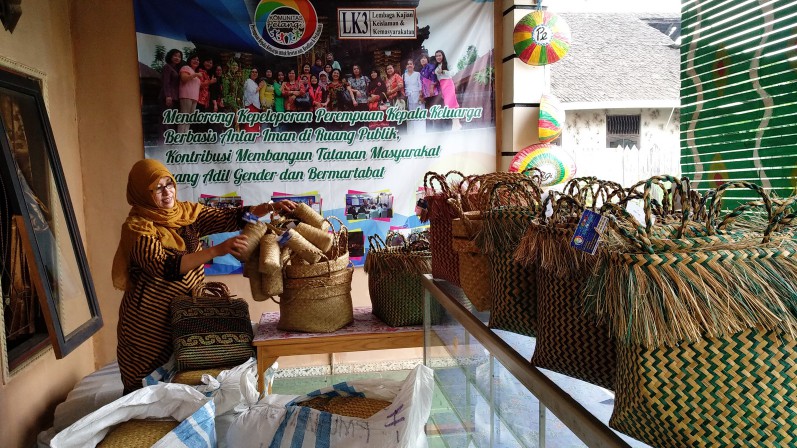A Silver Lining to Restoration in Concession Areas
By ZamzamiBringing Purun from the Fringe to the Center
About the author: Budi Kurniawan is a journalist and Pantau Gambut contributor in South Kalimantan.
Kapal Gandengan Taksi by H Anang Ardiansyah
Kapal mabajangkar
Rapat gandengan di tangah sungai
Masin bakukus
Bandirat kabus
Roda baputar batagar
Marabahan tujuannya
Ada dua pang dua minggu
Babulang bulik ka Barito
Sungai Saluang di kampung Wangkang
Banyak batahan kada tumpangan
Kipit wadahnya barabutan
Harap tiada landas banyunya
Harap tiada talanggar gosong
Harap banyak naik tumpangan
Harap banyak duit tambangan
Takumpul kasugihan
Kapal gandengan taksi
Labuh jangkar di Margasari
Manukar tikar barang salambar
Wan tali ayunan kakanakan…
Enshrined in many Banjar songs are wicker crafts woven from purun and purchased from villages on the riverbanks of South Kalimantan. One of them is “Kapal Gandengan Taksi”, a song written and composed by H. Anang Ardiansyah around 1910.
The song revolves around the journey of a passenger ship serving the inland Banjarmasin route to Barito in Central Kalimantan. On the way, this diesel-powered vessel stopped in Marabahan in the Barito Kuala district and Margasari in the Tapin district.
In the two rapidly growing cities, passengers descended. They bought woven mats and rope swings for children made from coconut husk. Today, Marabahan and Margasari have transformed into purun handicraft production hubs. Purun is widely known as a kind of grass that grows in peatlands in South Kalimantan. Crafts from purun take various shapes and sizes, from mats, bags, baskets, hats and sandals, to decorative ornaments for chairs, tables, and cabinets.
Since most of the land is peatland or peat swamp ecosystem, purun grows and spreads across almost all districts in South Kalimantan. Areas that are not mentioned in the song “Kapal Gandengan Taksi”, such as Amuntai in Hulu Sungai Utara and Banjarbaru, have also transformed into purun handicraft centers. With the support of various programs implemented by both NGOs and the local government, purun has now become a superior material that also represents the identity of the tribes of Banjar and South Kalimantan.
However, craftsmen in South Kalimantan still face the same issues. There remain difficulties in reaching markets and accessing capital. Few parties help to build a network of markets and capital resources for craftsmen. This is what attracted the attention of Mariatul Asiah and her friends in Komunitas Pelangi in Banjarmasin. Atul, as Mariatul Asiah is usually called, is committed to overcoming the struggles of these craftsmen.
Atul, born on 31 May 1976 in Barabai in the Hulu Sungai Tengah district of South Kalimantan, partnered with friends in her community to build a network for purun craftsmen in various regions. They went directly to the craftsmen and gathered information about patterns, the availability of materials, prices, and the variety of purun products. Atul herself also got hands-on training in purun weaving. "It turns out that weaving purun into a single piece is extraordinary difficult," she said.
Understanding the difficulties of the craftsmen, Atul and her friends, including Ida Mawardi, a senior journalist and lawyer, drafted a concept to tackle the issue. Their concept was to create a system in which consumers could buy a variety of purun handicrafts directly from the craftsmen. The prices they offer are more than worth it, ranging from IDR 6000 to IDR 35000 (US$0.4–$2.40). Relationships with the artisans are merely one-off sales; handicrafts are paid for on the spot. "This is in order to build trust and responsibility for the craftsmen," said Ida Mawardi.
Atul graduated with a bachelor’s degree from the Faculty of Tarbiyah (Holistic education), Department of Islamic Education at IAIN Antasari, Banjarmasin and a master’s degree from the Faculty of Cultural Sciences, Department of Anthropology at Gadjah Mada University, Yogyakarta. After completing her studies, she built this marketing system. "Purun like this is a product on the peripheries. Well, it's time purun is brought to the center," Atul said last week in Banjarmasin.
Purun can be expensive when on the modern commercial market. Take shopping malls for example. Atul decided to cooperate with a large supermarket chain in Banjarmasin. This supermarket is part of a larger network from Jakarta. When the supermarket opened last month, hundreds of purun bags graced the hands of invitees.
After the opening of the supermarket, Atul and her friends were entrusted with supplying purun handicrafts. Atul became increasingly optimistic when the mayor of Banjarmasin, Ibnu Sina, pronounced that supermarkets can operate in Banjarmasin as long as they make room for local crafts. Ibnu Sina also prominently displayed purun decorations in the events held in Pemko Banjarmasin. Folders and plastics used in seminars, for instance, are now being replaced by purun.
Atul, who is also a lecturer at UIN Antasari Banjarmasin, is also an activist for harmony between religious communities and women's issues. She is now working to expand the network to more districts in South Kalimantan. "We do not just buy craftsmen’s products. We also hold trainings for them. The hope is that the quality, pattern, and diversity of the handicrafts made from purun develops through these trainings," Atul explained. As part of Komunitas Pelangi, Atul also organizes women of various religions to enhance the presence of pioneering women in public spaces.
With Atul, Komunitas Pelangi has now established and is in the process of developing a gallery space in Banjarmasin. In this gallery, they exhibit various purun crafts. This is a step beyond marketing at shopping malls. The gallery, located not far from the center of Banjarmasin City, includes a library and a discussion room, which provides room for dialogue regarding various topics, especially women’s issues. "What we do may be small, but hopefully useful. I hope it is able to bring purun to urban centers," he said.




